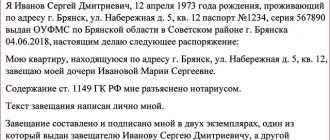Sometimes it becomes necessary to evict tenants, relatives or ex-spouses from an apartment. But this can only be done after receiving a court decision on eviction, because Article 40 of the Constitution of the Russian Federation does not allow leaving a person without housing just like that.
In order for the court to satisfy the plaintiff’s demands, the necessary grounds are needed, which are prescribed in the Housing and Civil Codes of the Russian Federation. We will look at them in more detail, but in some cases the eviction process can be complex and drawn out, since it often meets resistance from those who are being evicted. If you are faced with this or are trying to illegally evict you from your apartment, it is better to contact experienced lawyers on housing issues.
Grounds for eviction
Both the Constitution of the country and the Housing Code (hereinafter referred to as the Housing Code of the Russian Federation) say that not a single person can be simply deprived of his home. Everyone has the right to freely use their housing. Accordingly, it is impossible to limit this right or deprive someone of housing arbitrarily.
However, the law establishes cases in which eviction is still possible. They mainly concern residential premises rented.
After all, owners can dispose of their property as they please. But at the same time, they must not allow violations of the interests of other persons. The Civil Code of the Russian Federation in Article 293 provides that owners through the court may be deprived of their housing if it is used for other purposes, in violation of the rights of neighbors, or if it is mismanaged.
Moreover, an appeal to the court in this case may follow if the owner has not responded to the warning made in this regard.
Other cases of termination of the possibility of using housing are provided for in the Housing Code of the Russian Federation. These include:
- loss of residence rights after divorce;
- recognition of the impossibility of living together between children and parents deprived of their rights;
- long-term non-payment of utility bills;
- lack of legal rights to reside in the premises;
- mismanagement of the premises leading to its destruction;
- systematic violation of the rights of neighbors;
- use of housing for other purposes;
- seizure of the premises in connection with the seizure of the land underneath it;
- recognition of housing as unsuitable;
- transferring it to non-residential status.
Why can you forcefully evict an owner?
According to Article 293 of the Civil Code of the Russian Federation, which reflects the conditions for forced eviction, it is said that this procedure can be carried out in the following cases:
- if the housing is used not for human habitation, but for other purposes;
- if public order is systematically violated, which disturbs others and neighbors;
- if the living space is subject to destruction, vandalism, or is not properly maintained;
- if the apartment has undergone illegal redevelopment, which creates a threat to the safety of neighbors;
- if you have accumulated debts for utility bills and housing maintenance;
- if sanitary and hygienic standards are not observed, which creates uncomfortable conditions for neighbors.
The above conditions are exhaustive and, as a rule, are not interpreted more broadly. But the court makes its final decision after considering all the materials of the case. It is worth bringing a solution to the housing issue to court only if it was not possible to find compromises and a pre-trial solution, that is, the evicted person did not vacate the living space of his own free will.
In case of a positive court decision on eviction, bailiffs, together with the police, with the presence of witnesses, carry out the eviction of the owner.
Procedure for eviction from an apartment by court decision
Depending on the reason, eviction from housing can be carried out in different ways. As a general rule, if a tenant commits any violations, he must be forcibly evicted through the court. For this case, a special procedure has been established for eviction, i.e. deprivation of citizens' rights to reside. You cannot do this in any order. First, you should send such a person (persons) an offer to voluntarily vacate the premises they occupy. If no response is received or a negative response is received, then you can proceed to judicial procedures.
Initially, you need to prepare a claim for eviction and evidence justifying the existence of grounds for this. Documents must be drawn up and submitted in accordance with the requirements of the procedural code. The success of the whole business largely depends on how competent and reasonable it is.
Such cases should be taken very seriously, because we are talking about the deprivation of a person’s constitutional right to housing. In some cases, it may be necessary to involve special bodies and third parties in the process. For example, guardianship authorities are called upon to take care of the interests of minors.
The eviction procedure through the court can take quite a long time. First, you need to wait for the court’s decision and its entry into force.
In the absence of complaints and obstacles on the other side, this can happen quickly. Otherwise, it will not be possible to immediately obtain a writ of execution to execute the decision. After receiving it, you can go to the bailiffs to enforce it.
Owned apartments: when the owner evicts
If the apartment is owned by one person, and others live and are registered in it, he has every right to evict them and deregister them.
Most often, such situations arise after a divorce or as a result of intrafamily conflicts. These issues are resolved through the court, usually in favor of the homeowner, unless we are talking about minor children.
It also happens that after the sale of a home, people registered in it are not discharged - these situations are also resolved in court.
We recommend! Is it worth taking out a loan secured by an apartment?
Forced eviction from an apartment
If the tenants do not voluntarily vacate the premises, then the only option left is their forced eviction. It can only be implemented if there is an appropriate court decision. This decision constitutes the legal basis that makes it possible to deprive citizens of housing. However, actual execution is carried out after it comes into force by bailiffs. Based on the writ of execution presented to them, they begin their proceedings.
The person obliged to evict is given five days to voluntarily vacate.
Next, they begin forced eviction procedures from the apartment. Bailiffs have the right to appear at the specified premises and forcibly remove residents from the apartment. In this case, the presence of police officers is allowed. In addition, witnesses must be present, an eviction act and an inventory of existing property must be drawn up.
Features for family members
What are the nuances when evicting family members of the former owner from an apartment? It is no secret that the issue related to the eviction of any person from the living space he occupies is quite complex.
And it has a number of nuances that must be observed in order not to violate current legislation. The most difficult issues are the eviction of relatives of former owners, as well as forced eviction.
The Civil Code of the Russian Federation established that from the moment the existing property right is transferred from one person to another, the previously existing rights to exploit the object of property relations among the relatives of the previous owner are terminated.
This means that if the owner of a property has transferred his rights to own and dispose of property, in particular an apartment or other residential premises, for example, a house, to another person, or he has been deprived of his existing rights by a court decision, his family members also lose the opportunity to use a specific premises for housing.
Termination of the right to use real estate for residence for family members of the former owner occurs at the moment of change of owner. This is recorded in Article 292 of the Civil Code of the Russian Federation.
This is due to the fact that family members of the former owner had the right, before the change of owner, only to use the premises, but not to dispose of them. Accordingly, the right of residence and registration after completion of the procedure for re-registration of ownership rights in a particular premises is terminated.
Read about the specifics of eviction from an apartment of unregistered persons or former spouses on our website.
Eviction from public housing
In most cases, evictions concern municipal housing. In this case, they can evict either with the provision of other housing (comfortable or not) or without the provision. Citizens can count on receiving other comfortable premises in the cases established by Art. 85 Housing Code of the Russian Federation. These include declaring premises unsuitable for living in or demolishing them or converting them into non-residential ones. Essentially, this applies to cases where the tenants themselves did not commit any violations, and the eviction occurs due to circumstances beyond their control.
It’s another matter if the reason is long-term (more than six months) non-payment of housing and communal services. In such a situation, replacement housing will also be provided, but according to the standards applied in hostels.
If residents commit serious violations of the rules for using their apartment, then they can no longer count on any replacement.
Such violations include:
- poor treatment of housing, leading to its destruction;
- using it for other purposes;
- infringement (ignoring) of the rights and interests of neighbors.
In addition, no other apartment will be provided to those parents who have been deprived of their rights in relation to their children. In this case, the court may determine that their life together with these children is considered unacceptable.
Who should not be evicted
There are categories of citizens who are subject to so-called immunity - they cannot be evicted from their homes even if there are obvious indications for this.
- Orphans of any age.
- Disability of 1st and 2nd groups, received during the performance of military duties or as a result of occupational diseases.
- Pensioners by age.
- Family members of the deceased tenant of service housing.
- Family members of the Ministry of Emergency Situations, Department of Internal Affairs, and military personnel who died in the line of duty.
Going to court
In many cases, it is possible to vacate the premises from negligent tenants only by a court decision. Most often, complaints are related precisely to the presence of violations on the part of tenants, as well as their families. Disputes of this kind are considered by district courts at the place of residence of the evicted residents. Local authorities, neighbors, ex-spouses, and homeowners can file claims.
You should be well prepared for going to court. Collect the necessary evidence, draw up a claim and other documents. The claim itself must indicate the existing reason for eviction and evidence of its existence.
In addition, it indicates the data of the parties to the dispute and other circumstances important for its consideration. To file a claim you also need to pay a state fee. The claim and all papers attached to it are sent to the court by mail or brought to its office on visiting days and hours. Many courts today also have electronic filing capabilities.
Documentation
In addition to the claim, the court also requires the provision of other documents. Their full list can be read in Art. 132 of the Civil Procedure Code (hereinafter referred to as the Code of Civil Procedure of the Russian Federation). Some of them are clearly named and relate to compliance with procedural issues. For example, a receipt for payment of state duty, copies of the claim and documents for other persons, a claim, a power of attorney (if the claim was signed by a representative).
The documents submitted to the court must strictly comply with these requirements. As for other documents, these can be any papers that prove the applicant’s position on the need to evict the premises.
These may include documents on non-payment of housing and communal services, acts on violations committed during the use of premises, protocols from the district police officer on violations, instructions from fire and sanitary services on the need to eliminate violations.
Deadlines
The process of reviewing such claims is quite complex. Judges treat decisions that serve as grounds for eviction of citizens from their homes with extreme caution. It is difficult to predict the duration of such a process; the law does not establish specific deadlines in this regard. It depends on many different circumstances. These include the volume of evidence presented, the positions of the parties, and the need to involve other persons.
In any case, you should not expect a decision to be made quickly. Even when it is issued, the party dissatisfied with it most often resorts to the appeal procedure. And this may take another couple of months to go through all the authorities. A decision that has already entered into force can begin to be executed by bailiffs.
Thus, before the actual eviction from the apartment, it can take from a couple of months to a year.
How to file a claim - sample
Any applications submitted to the court must comply with the requirements of procedural law. Therefore, before submitting them, you should familiarize yourself with the contents of Art. 131, 132 Code of Civil Procedure of the Russian Federation. The claim must include the name of the court, the parties to the dispute, their details, addresses, and the circumstances that prompted them to go to court.
The reasons for the requested eviction, as well as the evidence supporting their existence, should be clearly stated with reference to the law. In addition, the claim itself must be clearly stated. The document must be readable and signed by the correct person. If it is submitted on behalf of authorities, then a seal is required. At the same time, the signature of an authorized person is placed on it. If a representative of any body or citizen acts, then a document on his powers is attached to the claim. An approximate example of its composition can be seen below.
Sample letter of claim for eviction.










